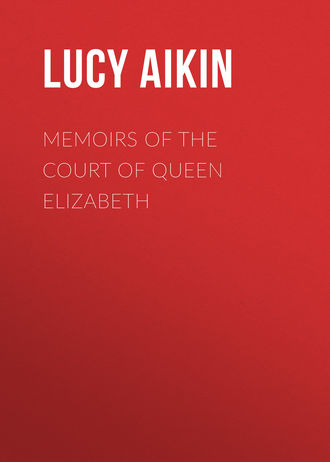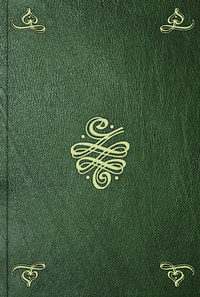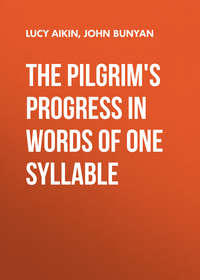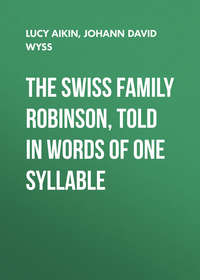 полная версия
полная версияMemoirs of the Court of Queen Elizabeth
Randolph soon after received instructions to express openly to Mary his sovereign's dislike of her matching either with the archduke or with any other foreign prince, and her wish that she would choose a husband within the island; and he was next empowered to add, that if the Scottish queen would gratify his mistress in this point, she need not doubt of obtaining a public recognition of her right of succession to the English crown. Elizabeth afterwards came nearer to the point; she designated lord Robert Dudley as the individual on whom she desired that the choice of her royal kinswoman should fall. By a queen-dowager of France, and a queen-regnant of Scotland, the proposal of so inferior an alliance might almost be regarded as an insult, and Mary was naturally haughty; but her hopes and fears compelled her to dissemble her indignation, and even to affect to take the matter into consideration. She trusted that pretexts might be found hereafter for evading the completion of the marriage, even if the queen of England were sincere in desiring such an advancement for her favorite, which was much doubted, and she determined for the present to show herself docile to all the suggestions of her royal sister, and to preserve the good understanding on her part unbroken.
It was during the continuance of this state of apparent amity between the rival queens, that Elizabeth thought proper to visit with tokens of her displeasure the leaders in an attempt to establish the title of the Suffolk line, which still found adherents of some importance.
John Hales, clerk of the hanaper, a learned and able man, and, like all who espoused this party, a zealous protestant, had written, and secretly circulated, a book in defence of the claims of the lady Catherine, and he had also procured opinions of foreign lawyers in favor of the validity of her marriage. For one or both of these offences he was committed to the Fleet prison, and the secretary was soon after commanded to examine thoroughly into the business, and learn to whom Hales had communicated his work. A more disagreeable task could scarcely have been imposed upon Cecil; for, besides that he must probably have been aware that his friend and brother-in-law sir Nicholas Bacon was implicated, it seems that he himself was not entirely free from suspicion of some participation in the affair. But he readily acknowledged his duty to the queen to be a paramount obligation to all others, and he wrote to a friend that he was determined to proceed with perfect impartiality.
In conclusion, Hales was liberated after half a year's imprisonment. Bacon, the lord keeper, who appeared to have seen the book, and either to have approved it, or at least to have taken no measures for its suppression or the punishment of its author, was not removed from his office; but he was ordered to confine himself strictly to its duties, and to abstain henceforth from taking any part in political business. But by this prohibition Cecil affirmed that public business suffered essentially, for Bacon had previously discharged with distinguished ability the functions of a minister of state; and he never desisted from intercession with her majesty till he saw his friend fully reinstated in her favor. Lord John Grey of Pyrgo, uncle to lady Catherine, had been a principal agent in this business, and after several examinations by members of the privy-council, he was committed to a kind of honorable custody, in which he appears to have remained till his death, which took place a few months afterwards. These punishments were slight compared with the customary severity of the age; and it has plausibly been conjectured that the anger of Elizabeth on this occasion was rather feigned than real, and that although she thought proper openly to resent any attempt injurious to the title of the queen of Scots, she was secretly not displeased to let this princess perceive that she must still depend on her friendship for its authentic and unanimous recognition.
Her anger against the earl of Hertford for the steps taken by him in confirmation of his marriage was certainly sincere, however unjust. She was provoked, perhaps alarmed, to find that he had been advised to appeal against the decision of her commissioners: on better consideration, however, he refrained from making this experiment; but by a process in the ecclesiastical courts, with which the queen could not or would not interfere, he finally succeeded in establishing the legitimacy of his sons.
Of the progresses of her majesty, during several years, nothing remarkable appears on record; they seem to have had no other object than the gratification of her love of popular applause, and her taste for magnificent entertainments which cost her nothing; and the trivial details of her reception at the different towns or mansions which she honored with her presence, are equally barren of amusement and instruction. But her visit to the university of Cambridge in the summer of 1564 presents too many characteristic traits to be passed over in silence.
Her gracious intention of honoring this seat of learning with her royal presence was no sooner disclosed to the secretary, who was chancellor of the university, than it was notified by him to the vice-chancellor, with a request that proper persons might be sent to receive his instructions on the subject. It appears to have been part of these instructions, that the university should prepare an extremely respectful letter to lord Robert Dudley, who was its high-steward, entreating him in such manner to commend to her majesty their good intentions, and to excuse any their failure in the performance, that she might be inclined to receive in good part all their efforts for her entertainment. So notorious was at this time the pre-eminent favor of this courtier with his sovereign, and so humble was the style of address to him required from a body so venerable and so illustrious!
Cecil arrived at Cambridge the day before the queen to set all things in order, and received from the university a customary offering of two pairs of gloves, two sugarloaves, and a marchpane. Lord Robert and the duke of Norfolk were complimented with the same gift, and finer gloves and more elaborate confectionary were presented to the queen herself.
When she reached the door of King's college chapel, the chancellor kneeled down and bade her welcome; and the orator, kneeling on the church steps, made her an harangue of nearly half an hour. "First he praised and commended many and singular virtues planted and set in her majesty, which her highness not acknowledging of shaked her head, bit her lips and her fingers, and sometimes broke forth into passion and these words; 'Non est veritas, et utinam'—On his praising virginity, she said to the orator, 'God's blessing of thy heart, there continue.' After that he showed what joy the university had of her presence" &c. "When he had done she commended him, and much marvelled that his memory did so well serve him, repeating such diverse and sundry matters; saying that she would answer him again in Latin, but for fear she should speak false Latin, and then they would laugh at her."
This concluded, she entered the chapel in great state; lady Strange, a princess of the Suffolk line, bearing her train, and her ladies following in their degrees. Te Deum was sung and the evening service performed, with all the pomp that protestant worship admits, in that magnificent temple, of which she highly extolled the beauty. The next morning, which was Sunday, she went thither again to hear a Latin sermon ad clerum, and in the evening, the body of this solemn edifice being converted into a temporary theatre, she was there gratified with a representation of the Aulularia of Plautus. Offensive as such an application of a sacred building would be to modern feelings, it probably shocked no one in an age when the practice of performing dramatic entertainments in churches, introduced with the mysteries and moralities of the middle ages, was scarcely obsolete, and certainly not forgotten. Neither was the representation of plays on Sundays at this time regarded as an indecorum.
A public disputation in the morning and a Latin play on the story of Dido in the evening formed the entertainment of her majesty on the third day. On the fourth, an English play called Ezechias was performed before her. The next morning she visited the different colleges,—at each of which a Latin oration awaited her and a parting present of gloves and confectionary, besides a volume richly bound, containing the verses in English, Latin, Greek, Hebrew, and Chaldee, composed by the members of each learned society in honor of her visit.
Afterwards she repaired to St. Mary's church, where a very long and very learned disputation by doctors in divinity was prepared for her amusement and edification. When it was ended, "the lords, and especially the duke of Norfolk and lord Robert Dudley, kneeling down, humbly desired her majesty to speak something to the university, and in Latin. Her highness at the first refused, saying, that if she might speak her mind in English, she would not stick at the matter. But understanding by Mr. Secretary that nothing might be said openly to the university in English, she required him the rather to speak; because he was chancellor, and the chancellor is the queen's mouth. Whereunto he answered, that he was chancellor of the university, and not hers. Then the bishop of Ely kneeling said, that three words of her mouth were enough." By entreaties so urgent, she appeared to suffer herself to be prevailed upon to deliver a speech which had doubtless been prepared for the occasion, and very probably by Cecil himself. This harangue is not worth transcribing at length: it contained some disqualifying phrases respecting her own proficiency in learning, and a pretty profession of feminine bashfulness in delivering an unstudied speech before so erudite an auditory:—her attachment to the cause of learning was then set forth, and a paragraph followed which may thus be translated: "I saw this morning your sumptuous edifices founded by illustrious princes my predecessors for the benefit of learning; but while I viewed them my mind was affected with sorrow, and I sighed like Alexander the Great, when having perused the records of the deeds of other princes, turning to his friends or counsellors, he lamented that any one should have preceded him either in time or in actions. When I beheld your edifices, I grieved that I had done nothing in this kind. Yet did the vulgar proverb somewhat lessen, though it could not entirely remove my concern;—that 'Rome was not built in a day.' For my age is not yet so far advanced, neither is it yet so long since I began to reign, but that before I pay my debt to nature,—unless Atropos should prematurely cut my thread,—I may still be able to execute some distinguished undertaking: and never will I be diverted from the intention while life shall animate this frame. Should it however happen, as it may, I know not how soon, that I should be overtaken by death before I have been able to perform this my promise, I will not fail to leave some great work to be executed after my decease, by which my memory may be rendered famous, others excited by my example, and all of you animated to greater ardor in your studies."
After such a speech, it might naturally be inquired, which college did she endow? But, alas! the prevailing disposition of Elizabeth was the reverse of liberal; and her revenues, it may be added, were narrow. During the whole course of her long reign, not a single conspicuous act of public munificence sheds its splendor on her name, and the pledge thus solemnly and publicly given, was never redeemed by her, living or dying. An annuity of twenty pounds bestowed, with the title of her scholar, on a pretty young man of the name of Preston, whose graceful performance in a public disputation and in the Latin play of Dido had particularly caught her fancy, appears to have been the only solid benefit bestowed by her majesty in return for all the cost and all the learned incense lavished on her reception by this loyal and splendid university53.
Soon after her return from her progress, the queen determined to gratify her feelings by conferring on her beloved Dudley some signal testimonies of her royal regard; and she invested him with the dignities of baron of Denbigh and earl of Leicester, accompanying these honors with the splendid gift of Kennelworth Castle, park and manor:—for in behalf of Dudley, and afterwards of Essex, she could even forget for a time her darling virtue,—frugality. The chronicles of the time describe with extraordinary care and minuteness the whole pompous ceremonial of this creation; but a much more lively and interesting description of this scene, as well as of several others of which he was an eye-witness in the court of Elizabeth, has been handed down to us in the entertaining memoirs of sir James Melvil; a Scotch gentleman noted among the political agents, or diplomatists of second rank, whom that age of intrigue brought forth so abundantly.
A few particulars of the history of this person, curious in themselves, will also form a proper introduction to his narrative.
Melvil was born in Fifeshire in the year 1530, of a family patronized by the queen regent, Mary of Guise, who having taken into her own service his brothers Robert and Andrew, both afterwards noted in public life, determined to send James to France to be brought up as page to the queen her daughter, then dauphiness. He was accordingly placed under the care of the crafty Monluc bishop of Valence, then on his return from his Scotch embassy; and previously to his embarkation for the continent he had the advantage of accompanying this master of intrigue on a secret mission to O'Neil, then the head of the Irish rebels. The youth was apparently not much delighted with his visit to this barbarous chieftain, whose dwelling was "a great dark tower, where," says he, "we had cold cheer, such as herrings and biscuit, for it was Lent." Arriving at Paris, the bishop caused him to be carefully instructed in all the requisite accomplishments of a page,—the French tongue, dancing, fencing, and playing on the lute: and after nine years spent under his protection, Melvil passed into the service of the constable Montmorenci, by whose interest he obtained a pension from the king of France. Whilst in this situation, he was dispatched on a secret mission to Scotland, to learn the real designs of the prior of St. Andrews, and to inform himself of the state of parties in that country.
In the year 1560 he obtained permission from his own sovereign to travel, and gained admission into the service of the elector palatine. This prince employed him in an embassy of condolence on the death of Francis II. Some time after his return he received a commission from the queen of Scots to make himself personally acquainted with the archduke Charles, who was proposed to her for a husband.
This done, he made a tour in Italy, and then returned to the elector palatine at Heidelberg. He was next employed by Maximilian king of the Romans to carry to France the portrait of one of his daughters, to whom proposals of marriage had been made on the part of Charles IX. At this court Catherine dei Medici would gladly have detained him; but a summons from his own queen determined him to repair again to Scotland.
Duke Casimir, son of the elector palatine, having some time before made an offer of his hand to queen Elizabeth, to which a dubious answer had been returned, requested Melvil, in passing through England, to convey his picture to that princess. The envoy, secretly despairing of the suit, desired that he might also be furnished with portraits of the other members of the electoral family, and with some nominal commission by means of which he might gain more easy access to the queen, and produce the picture as if without design. He was accordingly instructed to press for a more explicit answer than had yet been given to the proposal of an alliance offensive and defensive between England and the protestant princes of Germany; and thus prepared he reached London early in the year 1564.
After some discourse with the queen on the ostensible object of his mission, Melvil found occasion to break forth into earnest commendations of the elector, whose service nothing, he said, but this duty to his own sovereign could have induced him to quit; and he added, that for the remembrance of so good a master, he had desired to carry home with him his portrait, as well as those of all his sons and daughters. "So soon as she heard me mention the pictures," continues he, "she enquired if I had the picture of duke Casimir, desiring to see it. And when I alleged that I had left the pictures in London, she being then at Hampton Court, and that I was ready to go forward on my journey, she said I should not part till she had seen the pictures. So the next day I delivered them all to her majesty, and she desired to keep them all night; and she called upon my lord Robert Dudley to be judge of duke Casimir's picture, and appointed me to meet her the next morning in her garden, where she caused to deliver them all unto me, giving me thanks for the sight of them. I then offered unto her majesty all the pictures, so she would permit me to retain the elector's and his lady's, but she would have none of them. I had also sure information that first and last she despised the said duke Casimir."
It was a little before this time that Elizabeth had been consulted by Mary on the proposal of the archduke, and had declared by Randolph her strong disapprobation of it.
She now told Melvil, with whom she conversed on this and other subjects very familiarly and with apparent openness, that she intended soon to mention as fit matches for his queen two noblemen, one or other of whom she hoped to see her accept. These two, according to Melvil, were Dudley and lord Darnley, eldest son of the earl of Lenox by the lady Margaret Douglas. It must however be remarked, that Melvil appears to be the only writer who asserts that the first suggestion of an union between Mary and Darnley came from the English queen, who afterwards so vehemently opposed this step. But be this as it may, it is probable that Elizabeth was more sincere in her desire to impede the Austrian match than to promote any other for the queen of Scots; and with the former view Melvil accuses her of throwing out hints by which the archduke was encouraged to renew his suit to herself. Provoked, as he asserts, by this duplicity, of which she soon received certain information, Mary returned a sharp answer to a letter from her kinswoman of seemingly friendly advice, and hence had ensued a coldness and a cessation of intercourse between them. But Mary, "fearing that if their discord continued it would cut off all correspondence between her and her friends in England," thought good, a few weeks after Melvil had returned to Scotland, to dispatch him again towards London, "to deal with the queen of England, with the Spanish ambassador, and with my lady Margaret Douglas, and with sundry friends she had in England of different opinions."
It was the interest of neither sovereign at this time to be on bad terms with the other; and their respective ministers and secretaries being also agreed among themselves to maintain harmony between the countries, the excuses and explanations of Melvil were allowed to pass current, and the demonstrations of amity were resumed between the hostile queens.
Some particulars of the reception of this envoy at the English court are curious, and may probably be relied on. "Being arrived at London I lodged near the court, which was at Westminster. My host immediately gave advertisement of my coming, and that same night her majesty sent Mr. Hatton, afterwards governor of the isle of Wight, to welcome me, and to show me that the next morning she would give me audience in her garden at eight of the clock." "The next morning Mr. Hatton and Mr. Randolph, late agent for the queen of England in Scotland, came to my lodging to convey me to her majesty, who was, as they said, already in the garden. With them came a servant of my lord Robert's with a horse and foot-mantle of velvet, laced with gold, for me to ride upon. Which servant, with the said horse, waited upon me all the time that I remained there."
At a subsequent interview, "the old friendship being renewed, Elizabeth inquired if the queen had sent any answer to the proposition of marriage made to her by Mr. Randolph. I answered, as I had been instructed, that my mistress thought little or nothing thereof, but attended the meeting of some commissioners upon the borders… to confer and treat upon all such matters of greatest importance, as should be judged to concern the quiet of both countries, and the satisfaction of both their majesties' minds." Adding, "the queen my mistress is minded, as I have said, to send for her part my lord of Murray, and the secretary Lidingtoun, and expects your majesty will send my lord of Bedford and my lord Robert Dudley." She answered, "it appeared I made but small account of my lord Robert, seeing I named the earl of Bedford before him, but that erelong she would make him a far greater earl, and that I should see it done before my returning home. For she esteemed him as her brother and best friend, whom she would have herself married had she ever minded to have taken a husband. But being determined to end her life in virginity, she wished the queen her sister might marry him, as meetest of all other with whom she could find in her heart to declare her second person. For being matched with him, it would remove out of her mind all fears and suspicions, to be offended by any usurpation before her death. Being assured that he was so loving and trusty that he would never suffer any such thing to be attempted during her time. And that the queen my mistress might have the higher esteem of him, I was required to stay till I should see him made earl of Leicester and baron of Denbigh; which was done at Westminster with great solemnity, the queen herself helping to put on his ceremonial (mantle), he sitting upon his knees before her with a great gravity.
But she could not refrain from putting her hand in his neck, smilingly tickling him, the French ambassador and I standing by. Then she turned, asking at me how I liked him? I answered, that as he was a worthy servant, so he was happy, who had a princess who could discern and reward good service. Yet, says she, you like better of yonder long lad, pointing towards my lord Darnley, who, as nearest prince of the blood, did bear the sword of honor that day before her."
"She appeared to be so affectionate to the queen her good sister, that she expressed a great desire to see her. And because their so much by her desired meeting could not so hastily be brought to pass, she appeared with great delight to look upon her majesty's picture. She took me to her bed-chamber, and opened a little cabinet, wherein were divers little pictures wrapped within paper, and their names written with her own hand upon the papers. Upon the first that she took up was written 'My lord's picture.' I held the candle, and pressed to see that picture so named; she appeared loath to let me see it, yet my importunity prevailed for a sight thereof, and I found it to be the earl of Leicester's picture. I desired that I might have it to carry home to my queen, which she refused, alleging that she had but that one picture of his. I said, 'Your majesty hath here the original, for I perceived him at the furthest part of the chamber, speaking with secretary Cecil.' Then she took out the queen's picture, and kissed it, and I adventured to kiss her hand, for the great love evidenced therein to my mistress. She showed me also a fair ruby, as great as a tennis-ball; I desired that she would send either it, or my lord of Leicester's picture, as a token to my queen. She said, that if the queen would follow her counsel, she would in process of time get all that she had; that in the meantime she was resolved in a token to send her with me a fair diamond. It was at this time late after supper; she appointed me to be with her the next morning by eight of the clock, at which time she used to walk in her garden."
"She enquired of me many things relating to this kingdom (Scotland) and other countries wherein I had travelled. She caused me to dine with her dame of honor, my lady Strafford (an honorable and godly lady, who had been at Geneva banished during the reign of queen Mary), that I might be always near her, that she might confer with me."





